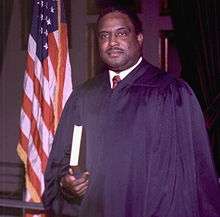Joseph W. Hatchett
| Joseph W. Hatchett | |
|---|---|
 | |
| Chief Judge of the United States Court of Appeals for the Eleventh Circuit | |
|
In office September 20, 1996 – May 14, 1999 | |
| Preceded by | Gerald Tjoflat |
| Succeeded by | Lanier Anderson |
| Judge of the United States Court of Appeals for the Eleventh Circuit | |
|
In office October 1, 1981 – May 14, 1999 | |
| Preceded by | Seat established |
| Succeeded by | Charles Wilson |
| Judge of the United States Court of Appeals for the Fifth Circuit | |
|
In office July 13, 1979 – October 1, 1981 | |
| Appointed by | Jimmy Carter |
| Preceded by | Seat established |
| Succeeded by | Seat abolished |
| Personal details | |
| Born |
September 17, 1932 Clearwater, Florida, U.S. |
| Alma mater |
Florida A&M University Howard University |
Joseph Woodrow Hatchett (born September 17, 1932)[1] is a former American jurist.
His mother worked as a maid and his father was a cotton picker. Born in Clearwater, Florida, Hatchett rose from these working class beginnings to become the first black man elected to the Florida Supreme Court.[2]
When he applied to law school in 1956, law schools in the state of Florida were still segregated. Hatchett attended Howard University Law School in Washington, D.C. On graduation in 1959, he returned to Florida, was admitted to the Florida Bar, and began a private practice.[2]
When Hatchett began his law practice, Jim Crow laws were still in effect in the state and segregation in schools, hotels, and other facilities was the norm. Hatchett took a more direct role in ending this. From 1960 to 1966 he worked with the NAACP Legal Defense Fund.[3]
On September 2, 1975, Hatchett was appointed to the Florida Supreme Court by governor Reubin Askew.[4] An even more significant step in ending racial separation was Hatchett's reelection in 1976. He became the first black justice to be reelected to the Florida Supreme Court.[2]
In 1979, Hatchett resigned his position as Florida Supreme Court Justice in order to step into another first. In that year Hatchett became the first black justice admitted to a federal court of appeals in the south [2] when he was appointed to the U.S. Court of Appeals for the 5th Circuit.[3] When the 5th Circuit split in 1981 to form the 5th Circuit and 11th Circuit,[5] Hatchett went with the 11th Circuit. He remained in this position until 1999 and served as Chief Judge of this body from 1996 to 1999.[3] He was succeeded as a federal judge by Charles R. Wilson, who had served as a law clerk under Hatchett.[6]
Hatchett now works as an of counsel attorney with Akerman Senterfitt in Tallahassee, Florida.[3]
References
- ↑
- 1 2 3 4 "Justice Joseph W. Hatchett". Florida Supreme Court. Retrieved 8 January 2009.
- 1 2 3 4 "Joseph W. Hatchett". Akerman Senterfitt. Retrieved 8 January 2009.
- ↑ Mary Agnes Thursby. "Succession of Justices of Supreme Court of Florida" (PDF). Florida Supreme Court. Archived from the original (PDF) on 27 September 2011. Retrieved 8 January 2009.
- ↑ "Establishment of the Eleventh Circuit: "An Act to amend title 28, United States Code, to divide the fifth judicial circuit of the United States into two circuits, and for other purposes."". Federal Judicial Center. Archived from the original on October 7, 2008. Retrieved 8 January 2009.
- ↑ Charles R. Wilson-Biography Directory of Federal Judges
External links
- Joseph Woodrow Hatchett at the Biographical Directory of Federal Judges, a public domain publication of the Federal Judicial Center.
| Legal offices | ||
|---|---|---|
| New seat | Judge of the United States Court of Appeals for the Fifth Circuit 1979–1981 |
Seat abolished |
| Judge of the United States Court of Appeals for the Eleventh Circuit 1981–1999 |
Succeeded by Charles Wilson | |
| Preceded by Gerald Tjoflat |
Chief Judge of the United States Court of Appeals for the Eleventh Circuit 1996–1999 |
Succeeded by Lanier Anderson |